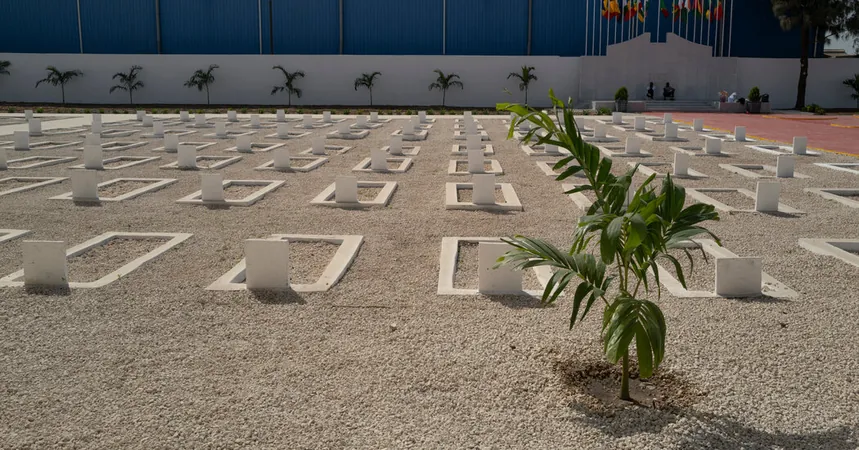
Senegal's Demand for Truth 80 Years After the Thiaroye Massacre: A Call for Accountability from France
2024-12-01
Author: Lok
In a typical classroom in Senegal last week, middle school students quietly absorbed a lesson from their history teacher, Aminata Diedhiou, recounting a story that has haunted the national memory for generations.
The tale unfolded in 1944 when French colonial forces executed a brutal massacre of West African soldiers returning from their service in World War II. These soldiers, who had bravely fought for France, were gathered at a garrison in Thiaroye, near Dakar, as they awaited the compensation owed to them for years of service.
The discussions among the students revealed their thirst for knowledge, and one particularly intrigued student, 16-year-old Amy Sall, voiced her desire to learn more about this tragic event. “Why did the French massacre them? How were they killed?” she asked, reflecting a growing awareness among young Senegalese about their country's past and ongoing struggles.
As Senegal prepares to mark the 80th anniversary of the Thiaroye Massacre, the government is intensifying its demands for France to disclose the full truth about the events that transpired on that fateful day. President Bassirou Diomaye Faye asserted that President Emmanuel Macron's recent acknowledgment of the tragedy as a “massacre” was merely the first step. “That is not enough,” he stated. Many in Senegal are insisting on clarity regarding the number of victims, the reasons behind the killings, and the fate of the bodies.
Historian Mamadou Diouf, who heads a newly formed research committee by the Senegalese government focusing on the Thiaroye events, emphasized that this push is indicative of a larger assertion of African sovereignty. He remarked, “Thiaroye could be the foundation for a Pan-African consciousness shared by all countries that have lost citizens to colonial violence.”
The Horrors of December 1, 1944
The morning of December 1, 1944, saw French colonial forces gather hundreds of West African soldiers, some from diverse regions across the continent, at the garrison in Thiaroye. Many of these men had endured years in Nazi camps and were now expressing their frustration over unpaid compensation.
Tension reached a boiling point, culminating in a horrific scene. Archives revealed that within just 15 seconds, more than 500 rounds were fired upon the unarmed soldiers. While the official French account cited only 35 deaths, many historians suggest the actual toll was at least 400, and they argue the systematic nature of the assault indicates it was premeditated.
The obscurity surrounding the identities of the victims and the concealment of evidence points towards a longstanding effort by France to shield its colonial past from scrutiny. Diouf articulated a shared sentiment among many Senegalese: “We need to write our own narrative,” he said.
Rekindling the Memory of Thiaroye
Despite the historical suppression, the legacy of the Thiaroye Massacre continues to influence Senegalese culture, surfacing in art, literature, and music. Films, such as Ousmane Sembène’s “Camp de Thiaroye,” have kept the memory alive across generations.
As the 80th anniversary approaches, the Senegalese government is taking steps to elevate Thiaroye as a political issue. In Dakar, billboards commemorate the tragedy, while renovations are underway at a military cemetery in Thiaroye for an official commemoration ceremony.
Every year, the local middle school honors the victims by raising the national flag and conducting commemorative activities, a practice that enriches the students’ understanding of their heritage and the sacrifices made by those lost in the massacre.
Breaking the Silence
Historically, Senegal's leaders have avoided addressing the Thiaroye Massacre directly, tending instead to preserve diplomatic relations with France post-independence in 1960. However, there is a noticeable shift in rhetoric—no longer are Senegalese leaders seeking clemency from their former colonizers over the past atrocities.
The French government has often claimed transparency with its historical records, yet evidence contradicts this narrative. For instance, during a previous anniversary commemoration in 2014, former President François Hollande raised the death toll to 70—still considerably lower than historians' estimates.
Recent efforts have mobilized Senegalese archivists to probe French archives for information to drive their demands for accountability and reparations. Sadly, for many, like Mr. Senghor—a man who lost his father in the massacre—the quest for justice and reparations remains unresolved, echoing a sentiment shared widely among the victims' descendants.
President Faye's call for honesty in the relationship is coupled with a plea for the departure of French troops still stationed in Senegal. This reflects a larger trend; as seen recently when Chad relinquished its military ties with France, many African nations are beginning to re-evaluate their relationships with former colonial powers.
Will France respond to Senegal’s cries for justice? As the 80th anniversary of the Thiaroye Massacre approaches, the world watches, waiting to see if true accountability will rise from the shadows of a painful colonial past.



 Brasil (PT)
Brasil (PT)
 Canada (EN)
Canada (EN)
 Chile (ES)
Chile (ES)
 España (ES)
España (ES)
 France (FR)
France (FR)
 Hong Kong (EN)
Hong Kong (EN)
 Italia (IT)
Italia (IT)
 日本 (JA)
日本 (JA)
 Magyarország (HU)
Magyarország (HU)
 Norge (NO)
Norge (NO)
 Polska (PL)
Polska (PL)
 Schweiz (DE)
Schweiz (DE)
 Singapore (EN)
Singapore (EN)
 Sverige (SV)
Sverige (SV)
 Suomi (FI)
Suomi (FI)
 Türkiye (TR)
Türkiye (TR)